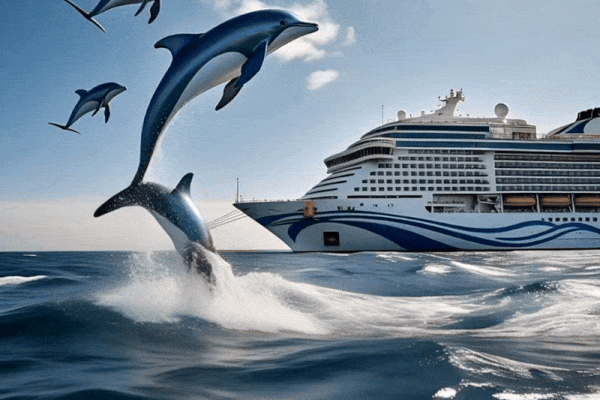Royal Caribbean Group (NYSE:RCL) delivered first-quarter 2025 financial results that exceeded expectations, reporting adjusted earnings per share of $2.71, $0.23 above previous guidance. Net yield rose by 5.6% year-over-year, driven by strong ticket pricing and onboard spending. Over 2 million guests sailed with the company during the quarter, and the company recorded its best Wave season ever. “In the month of April, bookings for 2025 are outpacing last year with close-in bookings trending particularly well,” said President and CEO Jason Liberty.
Company executives outlined an ambitious technology roadmap aimed at deepening guest loyalty, increasing digital engagement, and enhancing operational efficiency. “We deepen customer relationships through data, personalization, and a frictionless experience that makes planning and enjoying a vacation seamless,” said Liberty. This includes a new, customer-centric travel platform and significant advances in AI-powered revenue management.
The company also continues to see accelerated use of its digital channels.
“Bookings in our app have doubled so far this year and loyalty members are more likely to book in the app than non-loyalty members,” Liberty added. These efforts support the company’s “flywheel” strategy, in which “each guest experience fuels deeper loyalty and more engagement,” and helps generate repeat business across its growing brand portfolio.
Why It Matters: Royal Caribbean’s strategy showcases how experience-based companies can deploy modern IT platforms and AI to gain a competitive edge in personalization, pricing, and operational execution. By investing in unified digital systems and enhancing mobile interfaces, the company is delivering not only on service, but also on scalable, data-informed decision-making. CIOs and digital leaders can draw lessons from Royal Caribbean’s shift toward identity-based booking systems, AI-powered pricing, and cross-brand loyalty ecosystems, especially in sectors seeking to turn episodic customers into lifetime value.
- AI at the Core of Yield Optimization and Pricing: Royal Caribbean has embedded artificial intelligence deeply into its pricing and revenue systems, allowing for real-time optimization that adapts to demand signals and customer behavior. CEO Jason Liberty emphasized, “Our yield management program has a tremendous amount of AI inside of it, and that gets smarter and smarter.” This AI-driven system empowers the company to raise prices closer to departure dates while still maintaining high load factors and guest satisfaction. These capabilities have become a crucial lever in managing economic uncertainty and maximizing profitability without over-reliance on promotional pricing.
- Loyalty-Driven Digital Ecosystem Boosts Engagement and Revenue: The company’s unified loyalty program is playing a pivotal role in both guest retention and upselling. “Members of our loyalty programs accounted for nearly 40% of our bookings last year,” Liberty noted, adding that these members “are more likely to book direct and spend 25% more per trip than non-members.” The loyalty system also enables cross-brand travel, allowing guests to move easily between Royal Caribbean’s ocean, river, and private destination products. This ecosystem not only deepens engagement but also generates higher-value bookings and reduces reliance on third-party distribution channels.
- New Travel Platform Shifts from Cabin-Centric to Customer-Centric Design: In a shift in digital architecture, Royal Caribbean is building a new booking and travel platform that reorients the system around guest identity and behavior. “We’re installing a new travel platform that will be centered around the customer instead of being centered around a cabin,” said Liberty. This reflects a broader digital transformation strategy aimed at delivering hyper-personalized experiences, whether for new-to-cruise customers or repeat guests. Such a platform also enables more effective use of data across the lifecycle—from discovery to booking to onboard services—helping to further drive loyalty and operational efficiency.
- Fleet-Wide Digital Modernization Applies Innovations from New Ships to Legacy Vessels: Royal Caribbean is using insights from its most technologically advanced ships to inform updates across its entire fleet. “We have a lot of… modernization activities that are taking some of the great learnings from the newer ships and rolling them back onto some of our legacy fleet,” Liberty shared. These updates include enhancements in stateroom technology, connectivity, and digital service layers that support a consistent guest experience regardless of ship age. By standardizing tech-driven experiences fleet-wide, the company ensures that its investments in innovation deliver value across both new capacity and long-standing assets.
- Mobile Engagement and Real-Time Data Fuel Agile Growth Strategy: The Royal Caribbean mobile app has seen a sharp rise in usage, especially among loyalty members, with bookings through the app doubling year-over-year. “We’re getting more and more reps out of those investments,” said Liberty, referring to increased customer interactions through digital channels. These tools allow for faster decision-making, tailored promotions, and a seamless booking-to-boarding experience. Real-time data insights from mobile and digital behavior also inform fleet deployment, itinerary planning, and onboard service enhancements, giving Royal Caribbean the agility to react to market shifts while improving customer satisfaction.
Go Deeper -> Royal Caribbean Q1 2025 Earnings – MarketBeat






